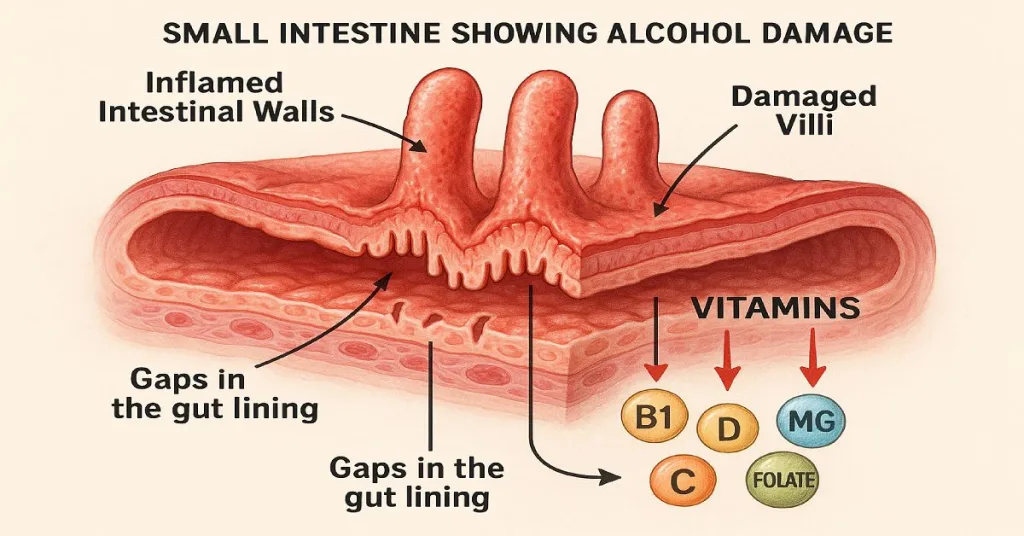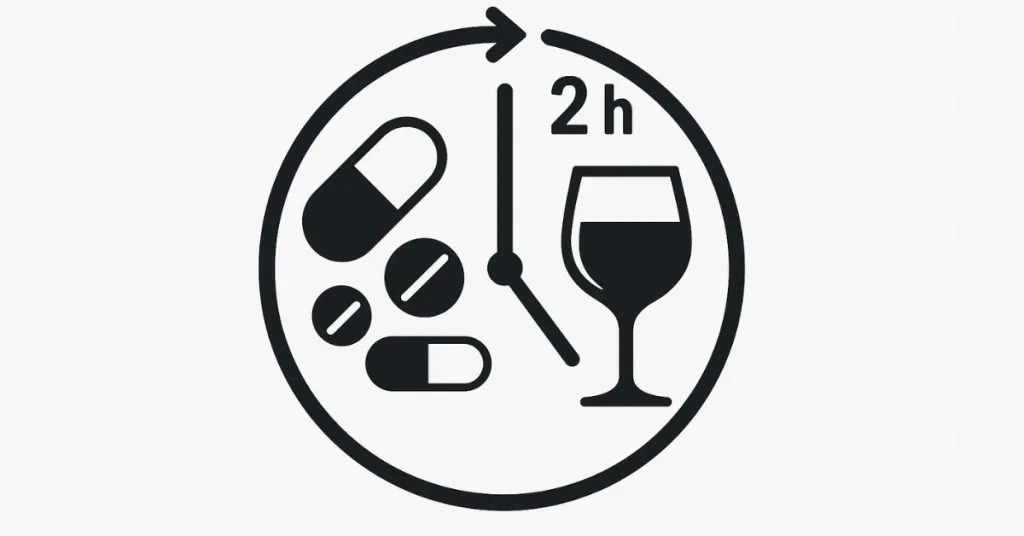Alcohol vitamin absorption is something most people never think about — but it could be sabotaging your supplement routine without you realizing it. There’s a lot of bad health advice floating around, but here’s one you can toss immediately:
“Beer has B vitamins, so it’s healthy!”
Sure, and ice cream has calcium, but no one’s handing it out as a bone supplement.
Alcohol — whether it’s beer, wine, whiskey, or that suspicious blue thing in a solo cup — affects your entire digestive system, your liver’s workload, and your ability to absorb nutrients from both food and supplements. And if you’re trying to get the most from your vitamins, or you’re spending good money on quality supplements, that matters.
So, what exactly does alcohol do to vitamin absorption? Can you take supplements and still enjoy the occasional drink — or are you just peeing your money away?
Let’s break it down. We’re diving into the science of alcohol vitamin absorption to understand what really happens when you mix supplements and booze.
This post may contain affiliate links. If you click and purchase, I may earn a small commission at no extra cost to you. I only recommend products I personally use or have thoroughly researched.
What Happens When You Drink: Your Body Hits Pause on Nutrition
Your liver clocks in for overtime
The moment alcohol enters your system, your liver shifts priorities. Instead of metabolizing vitamins, fats, and hormones, it goes straight to work breaking down ethanol — a toxic substance, as far as your body is concerned. That means less energy going toward processing other nutrients — especially fat-soluble ones like vitamins A, D, E, and K.
Your gut lining takes a beating
Alcohol irritates and inflames the digestive tract — especially in the small intestine, where most nutrient absorption takes place. Over time (or even in one wild night), it can damage the lining enough to reduce your ability to absorb vitamins and minerals from food or pills.
Diuretic = nutrient drain
Alcohol makes you pee more. And when you’re flushing fluids, you’re also flushing out water-soluble nutrients — particularly B vitamins, vitamin C, magnesium, potassium, and zinc. Ever wonder why hangovers feel like trash? You’re probably nutrient depleted.

Vitamins & Nutrients Alcohol Interferes With Most
Let’s call out the big victims here. These are the nutrients that alcohol messes with the most — especially with regular drinking.
1. Vitamin B1 (Thiamine)
Alcohol dramatically lowers thiamine absorption and increases your risk of deficiency. Chronic drinkers are often thiamine deficient, which can lead to nerve damage, fatigue, and Wernicke-Korsakoff syndrome (a serious brain disorder).
⚠️ Even weekend drinkers can drain their B1 stores faster than they realize.
2. Folate (Vitamin B9)
Folate is crucial for red blood cell production and DNA synthesis. Alcohol reduces folate absorption in the gut and increases excretion — and low folate is linked to fatigue, irritability, and poor detox function.
3. Vitamin B12
Chronic alcohol intake damages the stomach lining and reduces intrinsic factor — a protein needed to absorb B12. Low B12 = low energy, poor mood, and brain fog.
4. Magnesium
Alcohol inhibits magnesium absorption and increases magnesium excretion through urine. That’s a double whammy — and magnesium is crucial for your heart, muscles, sleep, and blood sugar.
5. Vitamin D
Fat-soluble D gets caught in the crossfire when your liver is too busy breaking down booze. Alcohol interferes with vitamin D activation and calcium balance, leading to weak bones, mood swings, and immune issues.
6. Calcium
Excess alcohol messes with hormones like parathyroid hormone (PTH) and reduces calcium absorption in the gut — pulling it from your bones instead. That’s why heavy drinkers often show signs of early bone loss or fractures.
7. Zinc
Zinc helps your immune system, skin, testosterone levels, and wound healing — and alcohol depletes it fast through urine. Zinc deficiency is common in drinkers and slows down your body’s recovery systems.
Are There Any Nutrients Alcohol Helps You Absorb?
Here’s the weird part. A few studies suggest that moderate beer consumption might raise vitamin B6 levels — not because alcohol is good for you, but because unfiltered beer contains small amounts of B6.
Still, nobody in their right mind should use beer as a multivitamin. You’d have to drink enough to cause other damage long before hitting any “beneficial” dose.
Should You Take Vitamins With Alcohol?
No.
Don’t take supplements while drinking — and don’t chase your vitamin D with a mimosa. Here’s why:
- Alcohol interferes with stomach acid and enzymes needed to break down pills
- Your gut is less efficient while alcohol is present
- Fat-soluble vitamins (A, D, E, K) require bile and proper liver function — both are compromised
- You’ll likely urinate out water-soluble vitamins (C, B-complex) faster
How Long Should You Wait?
Let’s talk timing.
If you’re going to drink, here’s how to protect your supplement game:
✅ Ideal:
Take supplements 2+ hours before or after drinking.
This gives your body time to process nutrients properly and prevents alcohol from derailing absorption.
❌ Worst time:
Right before, during, or after drinking — especially on an empty stomach.
In fact, it’s best to eat something before drinking, especially a meal with healthy fat and protein. It slows alcohol absorption and protects your gut lining.

Daily Drinkers, Listen Up: Long-Term Deficiencies Are Real
If you regularly drink — even moderately — your nutrient needs are higher, not lower. Alcohol interferes with both absorption and storage. That means you may need:
- Higher doses of B-complex, magnesium, and zinc
- More gut support (L-glutamine, probiotics, digestive enzymes)
- Liver support like NAC, milk thistle, or alpha-lipoic acid
- Regular breaks from alcohol for nutrient recovery
Long-term alcohol use depletes vitamins faster than you can replace them. If you take quality supplements, you’re wasting your money if you drink every night without adjusting.
Best Supplements for Occasional Drinkers
If you enjoy a drink or two a week but still want your supplements to work, focus on timing and support nutrients:
- NAC (N-Acetyl Cysteine) – Supports liver detox and glutathione
- Magnesium glycinate – Replenishes what alcohol flushes
- B-complex (with methylated B12 and folate) – Restores energy, brain health
- Liver support stacks – Look for combos with milk thistle, dandelion, turmeric
- Probiotics – Alcohol messes with gut bacteria; replenish them regularly
Final Word: Can You Supplement and Still Drink?
Yes — but you need to be smart about it.
Alcohol is not a vitamin, not a digestive aid, and not a metabolism booster.
It interferes with nutrient absorption in multiple ways, even if you’re only drinking casually. If you take supplements, you owe it to yourself to time them right and adjust for alcohol’s effects.
So enjoy the occasional drink — but don’t let it rob your body of the nutrients you’re paying for.
see also: How To Start Taking Supplements: A Beginner’s Blueprint